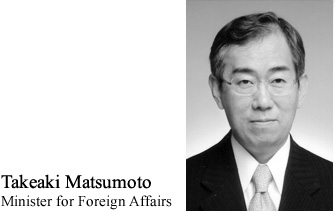Japan's Official Development Assistance White Paper 2010
Foreword
It was on March 9, 2011 that I took the office of Minister for Foreign Affairs. Immediately after that, on March 11, the Tohoku-Pacific Ocean earthquake and tsunami struck and devastated in and around the Tohoku region. For the time of this catastrophe, 134 countries and regions as well as 39 international organizations have offered to extend assistance to Japan (as of March 31). Not a few are developing countries to which Japan has provided a variety of international cooperation including official development assistance (ODA). I would like to express my sincere appreciation for the many heartfelt assistance offers towards Japan. At the same time, I am deeply touched upon the messages from partner countries, which commend Japan's serious attitudes to ODA for its partners' benefit.
In order to overcome and recover from this difficulty, it is important to maintain the confidence of the international community. The security and affluence of Japan depends on the peace and prosperity of world. The great earthquake significantly damaged Japan and we face a national crisis today, however it does not change the importance of international cooperation including ODA.
The "ODA Review Final Report", released in June 2010 to improve ODA's strategic value and effectiveness, identifies the priority areas as: reducing poverty (contributing to the achievement of the Millennium Development Goals [MDGs]); investing in peace; and supporting sustainable growth. Prime Minister Kan, at the UN MDGs Summit in September 2010, announced the "Kan Commitment", substantial contributions for the achievement of the MDGs, and introduced new development policies on health and education. To steadily implement the "Kan Commitment", Japan will proactively tackle the issues of maternal and child health and promote the achievement of universal primary education, considering the perspective of human security.
Japan will also continue to prioritize efforts to cope with global issues such as environmental and climate change problems. The understanding and cooperation of developing countries are indispensable to solve them. In October 2010, as chair of the tenth meeting of the Conference of the Parties to the Convention on Biological Diversity (COP10), Japan led the meeting to a success and launched the "Life in Harmony Initiative" to support developing countries in their efforts towards the conservation and sustainable use of biodiversity.
Furthermore, Japan will actively utilize ODA to advance its economic diplomacy such as the international promotion of Japan's high quality infrastructure and securing stable supplies of resources. We promote development of developing countries as well as our national interests. Our international cooperation contributes to both Japan and developing countries.
In implementing ODA, it becomes more and more important to work closely together with NGOs and the business community, as well as to obtain public understanding and support. This ODA White Paper reports on the progress of Japan's ODA, with a focus on its achievement of the last fiscal year. It also gives explanations on the major developed issues of the fiscal year. Along with Japan's initiatives for the achievement of the MDGs, Part 2 "A New ODA" explains ODA for economic diplomacy. I hope this Paper will help you to understand Japan's international cooperation.
March 2011

